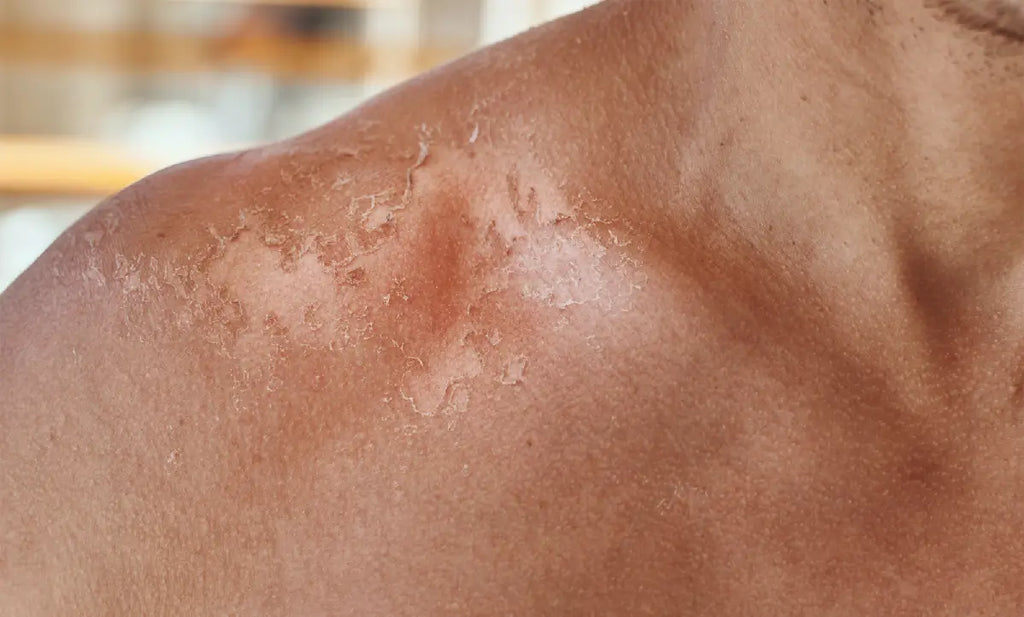Using skincare treatments like chemical peels, retinoids, or exfoliants can be beneficial for smoother, brighter skin. But sometimes, these products can irritate the skin or cause minor chemical burns—especially if your skin barrier is compromised or the product is too strong for your skin type.
If you’ve ever experienced redness, stinging, flaking, or even blistering after using a new skincare product, you’re not alone. In this article, we’ll go over what causes these reactions, how to treat skincare-related burns, and when it’s time to seek professional help.
What Causes Burns from Skincare Products?
Not all skincare burns are the same, and they don't always look like typical heat burns. Often, they're caused by harsh ingredients like:
- Exfoliating agents like alpha hydroxy acids (AHAs) and beta hydroxy acids (BHAs) are commonly found in chemical peels and resurfacing treatments.
- Retinoids (like retinol or tretinoin)
- Vitamin C in high concentrations
- Benzoyl peroxide or hydroquinone
- Overuse of exfoliants or fragrance-heavy products
These ingredients can disrupt the skin barrier, increase sensitivity, and lead to reactions like redness, peeling, or even blister-like symptoms.
Early Signs of a Chemical Burn or Irritation
After applying a product, you might notice the following signs of a potential chemical burn or reaction:
- Intense burning or stinging sensation
- Bright redness or rash-like appearance
- Swelling or inflammation
- Dryness, peeling, or tightness
- Skin that feels hot to the touch
- In severe cases, small blisters or open areas
Recognizing these symptoms early is key to preventing long-term skin damage.
Immediate Steps to Take
If your skin starts reacting negatively after using a product or undergoing a treatment, take the following steps right away:
-
Stop Using the Product Immediately
Remove it with lukewarm (not hot) water, and avoid scrubbing. -
Cool the Skin
Apply a clean, damp compress to calm heat and reduce inflammation. Do not apply ice directly to the skin. -
Avoid Active Ingredients
Put all exfoliants, retinoids, and treatments on pause. Focus only on healing and hydration. -
Use a Barrier Repair Ointment
Choose a fragrance-free, occlusive product like petroleum jelly or a gentle healing balm to lock in moisture and protect the damaged skin. -
Stick to Simple, Gentle Skincare
Use a basic cleanser and moisturizer. Look for calming ingredients like:
- Centella asiatica
- Aloe vera
- Panthenol (Vitamin B5)
- Ceramides
What Not to Do
- Don’t exfoliate or scrub the damaged area.
- Avoid sun exposure—burned or peeling skin is highly vulnerable to UV rays.
- Skip actives like retinol, acids, and vitamin C until your skin has fully healed.
- Don’t cover broken skin with makeup if you see open areas or oozing.
When to See a Dermatologist
While many minor burns can be treated at home, it’s important to get medical attention if you notice:
- Blisters or open wounds that worsen
- Intense pain or throbbing
- Signs of infection (pus, yellow crusting, or spreading redness)
- No improvement after several days of care
- A recurring reaction from products you used safely before
Chronic inflammation and untreated burns can lead to long-term discoloration or scarring, so don’t hesitate to get help if you're unsure.
Tips for Preventing Skincare Burns
To reduce the risk of future reactions:
- Test new skincare items on a small patch of skin—like your jawline or wrist—before using them on your entire face.
- Introduce actives slowly, especially acids and retinoids.
- Don’t mix too many actives in one routine.
- Skip chemical peels and exfoliating products if your skin is already feeling dry, tight, or inflamed.
- Wear sunscreen daily to protect your skin barrier, especially after treatments.
Final Thoughts
Skincare should support your skin, not harm it. If a product causes burning, redness, or flaking beyond what’s expected, it’s time to reassess your routine. With proper care and attention, most skincare-related burns heal without lasting damage.
At Celluheal, we believe in supporting your skin through every stage of healing—whether you're managing irritation, dryness, or post-treatment recovery. Always listen to your skin, and don't hesitate to seek expert care when needed.

